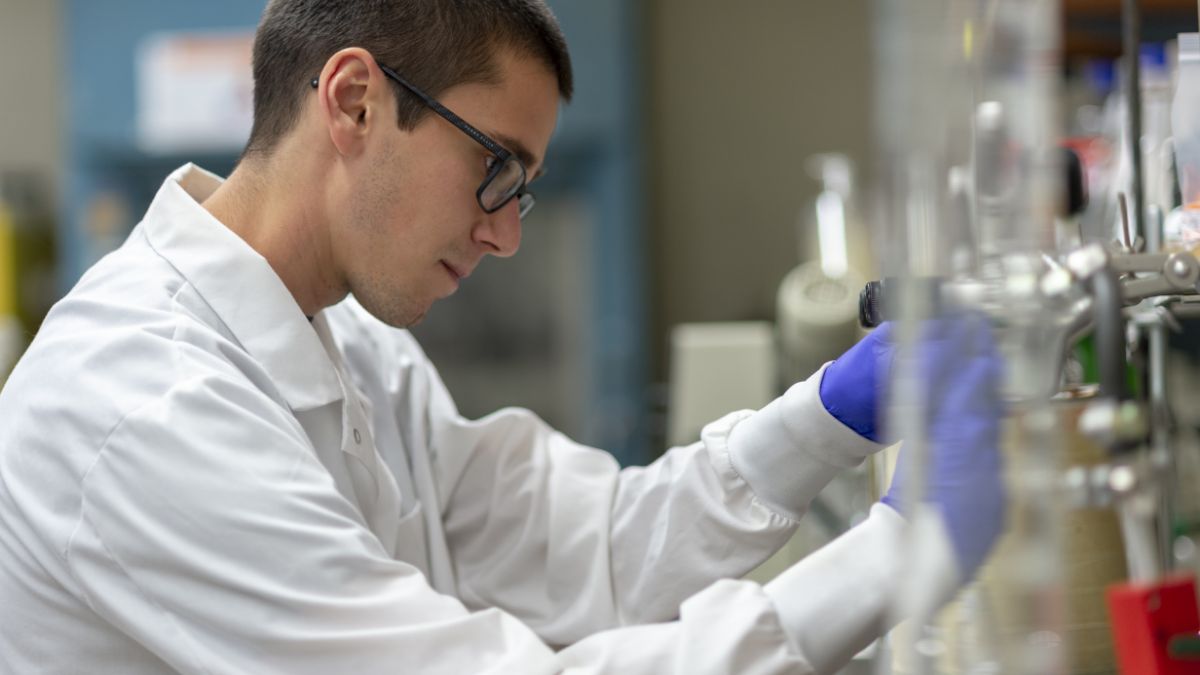Chemistry Bachelor of Science Degree

Chemistry
Bachelor of Science Degree
- RIT /
- Rochester Institute of Technology /
- Academics /
- Chemistry BS
In RIT’s chemistry BS, you’ll research chemicals to discover, develop, or improve products like paints, pharmaceuticals, cosmetics, electronic components, and more.
3
Goldwater Scholars
25+
Lab spaces including teaching, research, and instrument labs
Overview for Chemistry BS
Why Study Chemistry at RIT
Prepare for Advanced Degrees: Follow in the footsteps of more than two-thirds of RIT’s chemistry students who have continued their education in graduate programs at top tier universities, including the University of Pennsylvania, University of California at Irvine, and Yale University.
Industry Networking Opportunities: Join the student chapters of the American Chemical Society, Alpha Chi Sigma Professional Fraternity, or American Society for Biochemistry and Molecular Biology to connect with other students and professionals in the field, attend national conferences, and access employment and career resources.
Undergraduate Research: Participate in chemistry research starting as early as your first year, preparing you for a wide range of careers with hands-on experience.
Pre-Med/Pre-Health and Pre-Vet Advising Programs: Receive personalized guidance to become a competitive candidate for admission to medical and veterinary schools and graduate programs in the health professions.
Direct Path to Medical School: RIT’s partnership with the University of Buffalo’s Jacobs School of Medicine offers eligible pre-health/pre-med students early admission and mentorship through the Early Opportunity Program in Medicine.
Strong Career Paths: Recent chemistry graduates are employed at Granite State Analytical, Quest Pharmaceutical Services, University of Rochester Laboratory for Laser Energetics, Worthen Industries, Inc., and Environmental Standards.
Accelerated Bachelor’s/Master’s Available: Earn both your bachelor’s and your master’s in less time and with a cost savings, giving you a competitive advantage in your field.
STEM-OPT Visa Eligible: The STEM Optional Practical Training (OPT) program allows full-time, on-campus international students on an F-1 student visa to stay and work in the U.S. for up to three years after graduation.
Chemistry is the science of the structure, properties, and reactions of matter. Chemists seek to understand matter at the molecular and atomic levels. Knowledge of chemistry is fundamental to an understanding of biology, biochemistry, geology and medicine, and areas of astronomy, physics, and engineering.
RIT’s Chemistry Bachelor of Science Degree
RIT’s chemistry BS prepares you for work in all areas of chemistry. You will be prepared for a wide variety of professional positions in industrial manufacturing and research, government, pharmaceuticals, and health care. You will also be ready to continue with graduate studies in chemistry or professional education in medicine or other health-related fields.
RIT Chemistry Degree Curriculum
Through Chemistry BS courses such as analytical, physical, organic, and inorganic chemistry, you'll develop a thorough understanding of substances and their chemical properties, how they can be manipulated, and how they can be transformed into new materials. This chemistry BS also offers the chance to choose a concentration or minor in complementary fields such as:
- Imaging science
- Business
- Graphic arts
- Psychology
- Biology
- Criminal justice
- Computer science
- Engineering
- Environmental science
- Forensics
- Mathematics
- Packaging science
- Physics
Hands-On Experience in Chemistry
The chemistry BS provides additional opportunities to gain real-world experience. Students are encouraged to take advantage of:
- Undergraduate research experiences that are available with professors within the School of Chemistry and Material Sciences to practice real-world lab applications of the information they are currently studying.
- RIT’s cooperative education and internship program includes science co-ops, with Advisors and the Office of Career Services and Cooperative Education are available to assist you in identifying and applying to co-op positions
Furthering Your Education in Chemistry
Combined Accelerated Bachelor's/Master's Degrees
Today’s careers require advanced degrees grounded in real-world experience. RIT’s Combined Accelerated Bachelor’s/Master’s Degrees enable you to earn both a bachelor’s and a master’s degree in as little as five years of study, all while gaining the valuable hands-on experience that comes from co-ops, internships, research, study abroad, and more.
- Chemistry BS/Chemistry MS: In this combined accelerated dual degree in chemistry, you will study matter at the molecular and atomic levels, preparing you for a wide range of careers in fields like pharmaceuticals, health care, manufacturing, and sustainability. With a strong emphasis on research at the undergraduate and graduate levels, you’ll work closely with mentors to get hands-on experience with the cutting-edge technology and techniques used by industry professionals. You’ll customize your degree during your graduate work with a concentration of courses and a research project that will help you stand out in the job market.
- Chemistry BS/Materials Science and Engineering MS: Set yourself apart with an accelerated dual degree combining a chemistry BS with a master’s in materials science and engineering. You’ll benefit from a comprehensive core curriculum while joining a close-knit chemistry community and engaging in hands-on learning from day one. You’ll have access to advanced technology and master bench techniques used by industry professionals with close mentorship from research-active faculty. The addition of a New York State certified professional master’s degree in materials science and engineering will equip you with in-demand skills that can be applied to developing new materials, systems, and technologies. Graduates of this interdisciplinary program are recruited for by top companies like Toyota, Tesla, Rocket Lab, 3M, Samsung Austin Semiconductor, Xerox, Northrop Grumman, and the NASA Glenn Research Center.
- +1 MBA: Students who enroll in a qualifying undergraduate degree have the opportunity to add an MBA to their bachelor’s degree after their first year of study, depending on their program. Learn how the +1 MBA can accelerate your learning and position you for success.
Pre-Med/Pre-Health Advising
RIT’s Office of Pre-Health Advising offers an advising program that’s open to all majors and provides personal, individualized academic counseling to help you create a comprehensive long-term strategy to assist you in building successful applications to medical, dental, and veterinary schools or graduate degrees in the health professions (e.g., occupational therapy, physical therapy, etc.). Our pre-health advisors will have in-depth conversations with you around critical topics that include academic planning and course selection, MCAT and other admission exams, undergraduate research opportunities, clinical experiences and field work, timelines, and much more. Learn more about pre-med/pre-health advising.
Pre-Vet Advising
RIT’s pre-vet advising program provides personalized support to help you prepare successful applications for veterinary medical school. Pre-vet advising offers guidance on course selection, veterinary and animal care experience requirements, the veterinary school application process, and more. Learn about RIT’s pre-vet advising program.
RIT/University of Buffalo’s Early Opportunity Program in Medicine
RIT pre-health/pre-med students have a direct path to medical school through an RIT partnership with the Jacobs School of Medicine and Biomedical Sciences at the University at Buffalo (UB). The Early Opportunity Program in Medicine allows eligible RIT students to secure a pre-admission offer to the Jacobs School while completing their undergraduate degree at RIT. Students accepted into the program gain early access to professional training and mentorship at UB’s medical school, helping them prepare for the demands of medical school and beyond. Learn more about the Early Opportunity Program in Medicine.
-
Join Us for Accepted Student Open House
Visit campus on March 28 or April 11 to meet faculty, tour campus, and ask your questions.
Careers and Cooperative Education
Typical Job Titles
| Chemist | Quality Assurance | Materials Engineer |
| QC Chemist/Packaging Scientist | Lab Technician | Research Assistant |
| Environmental Chemist |
Industries
-
Biotech and Life Sciences
-
Consumer Packaged Goods
-
Food and Beverage
-
Manufacturing
-
Medical Devices
-
Oil and Gas
-
Pharmaceuticals
Cooperative Education
What’s different about an RIT education? It’s the career experience you gain by completing cooperative education and internships with top companies in every single industry. You’ll earn more than a degree. You’ll gain real-world career experience that sets you apart. It’s exposure–early and often–to a variety of professional work environments, career paths, and industries.
Co-ops and internships take your knowledge and turn it into know-how. Science co-ops include a range of hands-on experiences, from co-ops and internships and work in labs to undergraduate research and clinical experience in health care settings. These opportunities provide the hands-on experience that enables you to apply your scientific, math, and health care knowledge in professional settings while you make valuable connections between classwork and real-world applications.
Cooperative education is optional but strongly encouraged for students in the chemistry degree.
Featured Work and Profiles
-
Chemistry, Culture, and Career - How RIT Shaped a Merck Scientist
Nnamdi Akporji ’16 came to RIT for its culture and discovered a passion for chemistry and research. He is now a Senior Scientist at Merck & Co., turning ideas into products.
Read More about Chemistry, Culture, and Career - How RIT Shaped a Merck Scientist -
From Pioneering Cancer Research Journey to Prestigious Goldwater Scholarship Award
Student Emily Mahoney has been awarded the prestigious Goldwater Scholarship for her outstanding cancer research accomplishments and contributions.
Read More about From Pioneering Cancer Research Journey to Prestigious Goldwater Scholarship Award -
From Student Support to Student Success in Chemistry MS
Kaitlyn Clark chose RIT for its access services and began as a mathematics major. With the support from multiple faculty members, she discovered chemistry and is now an MS graduate.
Read More about From Student Support to Student Success in Chemistry MS -
From RIT to Unilever: The Learning Journey Continues
Shin Lutondo ’18 (chemistry) Shin Lutondo ’18 took advantage of all RIT had to offer - research, co-ops, MOCHA, intramural sports. Today he applies that diverse learning experience to the Research & Development community at...
Read More about From RIT to Unilever: The Learning Journey Continues -
Alum Sparks Change in Semiconductors
Alex Knowles leverages his RIT education to spearhead cutting-edge advancements in semiconductor manufacturing, driving innovation and efficiency at Skyworks Solutions.
Read More about Alum Sparks Change in Semiconductors -
Performing on Stage and in the Lab at RIT
Amyria Kimble ‘24 (chemistry) Amyria Kimble understands how scientists and performers use the same skills to bring their ideas to life, so it’s no surprise she formed Pandemic Step Team, the first-ever step club at RIT.
Read More about Performing on Stage and in the Lab at RIT
Curriculum for 2025-2026 for Chemistry BS
Current Students: See Curriculum Requirements
Admissions and Financial Aid
This program is STEM designated when studying on campus and full time.
First-Year Admission
First-year applicants are expected to demonstrate a strong academic background that includes:
- 4 years of English
- 3 years of social studies and/or history
- 3 years of mathematics is required and must include algebra, geometry, and algebra 2/trigonometry. Pre-calculus is recommended.
- 2-3 years of science is required and must include chemistry. Biology is recommended.
Transfer Admission
Transfer applicants should meet these minimum degree-specific requirements:
- A minimum of college algebra is required. Pre-calculus or calculus is preferred.
- Chemistry is required.
Financial Aid and Scholarships
100% of all incoming first-year and transfer students receive aid.
RIT’s personalized and comprehensive financial aid program includes scholarships, grants, loans, and campus employment programs. When all these are put to work, your actual cost may be much lower than the published estimated cost of attendance.
Learn more about financial aid and scholarships
Accreditation
Research
Undergraduate Chemistry Research Opportunities
Many students join research labs and engage in research starting as early as their first year. Participation in chemistry research leads to the development of real-world lab techniques, enhanced problem-solving skills, and broader career opportunities. Our students have opportunities to travel to national conferences for presentations and also become contributing authors on peer-reviewed manuscripts. Explore the variety of chemistry undergraduate research happening across the university.
Related News
-
August 21, 2025

Newest RIT Tigers encouraged to aim high and be themselves
RIT’s newest Tigers were formally welcomed Thursday with cheers, advice, and challenges to dream big.
-
February 17, 2025

Rochester City Ballet and RIT present ‘Visionary’
Rochester City Ballet is teaming up with RIT to present “Visionary,” a four-piece showcase of classical and contemporary movement, including a world premiere version of Boléro.
-
January 26, 2024

RIT professor’s paper on perovskites’ self-healing properties published in ‘Nature Communications’
Ahmad Kirmani’s research is helping to expand and improve space exploration through understanding how the metal-halide perovskite, the next-generation printable semiconductor, reacts to harsh extraterrestrial conditions and self-heals in those conditions.
Contact
- Michael Heagy
- School Head
- Dean’s Office
- College of Science
- 585‑475‑2090
- mdhsch@rit.edu
School of Chemistry and Materials Science






















